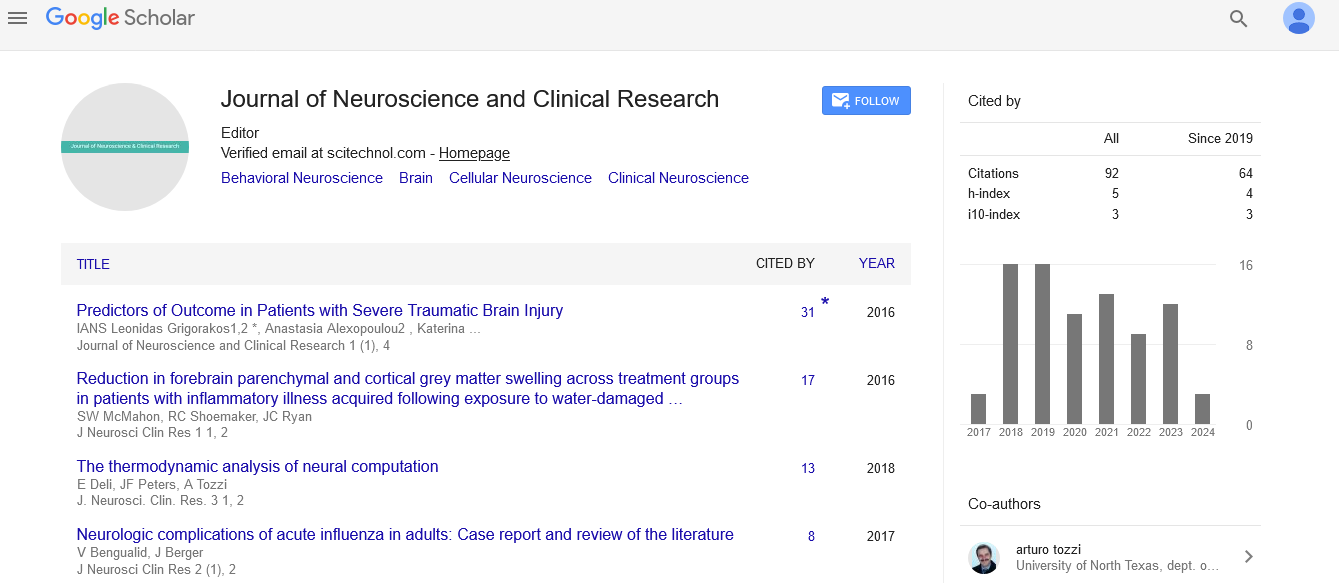Commentary, J Neurosci Clin Res Vol: 8 Issue: 3
The Role of Cellular Neuroscience in Neurological Disorders
Felix Montgomery*
1Department of Behavioral Neurology, Harvard Medical School, Boston, United States of America
*Corresponding Author: Felix Montgomery,
Department of Behavioral Neurology,
Harvard Medical School, Boston, United States of America
E-mail: felix.34@gmail.com
Received date: 28 August, 2023, Manuscript No. JNSCR-23-115248;
Editor assigned date: 30 August, 2023, PreQC No. JNSCR-23-115248 (PQ);
Reviewed date: 13 September, 2023, QC No. JNSCR-23-115248;
Revised date: 21 September, 2023, Manuscript No. JNSCR-23-115248 (R);
Published date: 28 September, 2023, DOI: 10.4172/Jnscr.1000165
Citation: Montgomery F (2023) The Role of Cellular Neuroscience in Neurological Disorders. J Neurosci Clin Res 8:3.
Description
Neurological disorders represent a diverse group of conditions that affect the central and peripheral nervous systems, often leading to a wide range of symptoms and functional impairments. Understanding the cellular and molecular mechanisms underlying these disorders is an essential step in advancing diagnosis, treatment, and prevention.
The cellular basis of neurological disorders
Neurological disorders encompass a wide array of conditions, including neurodegenerative diseases like Alzheimer's, Parkinson's, and Amyotrophic Lateral Sclerosis (ALS), as well as neuropsychiatric disorders such as schizophrenia, bipolar disorder, and depression. While the clinical presentations of these disorders may vary, they often share common cellular and molecular abnormalities.
Neurodegenerative diseases: In neurodegenerative diseases, such as Alzheimer's and Parkinson's, cellular neuroscience has revealed the accumulation of abnormal proteins, like beta-amyloid plaques and alpha-synuclein aggregates. These protein aggregates disrupt cellular function, leading to the death of neurons and the progressive loss of cognitive or motor functions.
Neuropsychiatric disorders: Conditions like schizophrenia and depression are associated with alterations in neurotransmitter systems, particularly dopamine and serotonin. Cellular neuroscience studies have uncovered imbalances in receptor expression, signaling pathways, and synaptic plasticity, shedding light on the cellular basis of these disorders.
Neurodevelopmental disorders: Disorders like Autism Spectrum Disorder (ASD) and Attention-Deficit/Hyperactivity Disorder (ADHD) have been linked to disruptions in neuronal migration, synapse formation, and neurotransmitter systems during early brain development.
Cellular neuroscience investigations are providing insight into the cellular events that contribute to these conditions.
Epilepsy: Epilepsy, characterized by recurrent seizures, often stems from aberrant electrical activity in neurons. Cellular neuroscience studies has identified ion channel dysregulation, neurotransmitter imbalances, and synaptic abnormalities as key contributors to seizure generation and propagation.
The promise of cellular neuroscience
Cellular neuroscience is driving progress in several areas related to neurological disorders:
Early diagnosis: By identifying cellular and molecular markers associated with specific disorders, experts aim to develop more precise diagnostic tools. Early diagnosis can facilitate timely interventions and improved outcomes.
Targeted therapies: Understanding the cellular mechanisms of neurological disorders has paved the way for targeted therapeutic interventions. Drug development efforts are focused on modulating specific molecular pathways implicated in these disorders.
Genetic insights: Advances in genomics have allowed for the identification of genetic mutations associated with neurological conditions. Cellular neuroscience studies are elucidating how these mutations lead to cellular dysfunction, providing opportunities for gene-based therapies.
Neuroregeneration: Cellular neuroscience studies is contributing to our understanding of neural regeneration and repair mechanisms. Strategies to stimulate neurogenesis and promote neural circuit remodeling are being explored for conditions like spinal cord injury and stroke.
Precision medicine: The era of precision medicine is emerging, tailoring treatments to an individual's unique genetic and cellular profile. This personalized approach holds great promise for optimizing therapeutic outcomes.
Conclusion
The role of cellular neuroscience in understanding neurological disorders cannot be overstated. Through meticulous studies into the cellular and molecular mechanisms at play, scientists are unraveling the mysteries of these complex conditions. This knowledge is leading to innovative diagnostic methods, targeted therapies, and the potential for personalized treatments, offering hope for individuals affected by neurological disorders and their families. As our understanding of cellular neuroscience continues to deepen, the cusp of transformative breakthroughs that may change the landscape of neurological disorder management in the years to come.
 Spanish
Spanish  Chinese
Chinese  Russian
Russian  German
German  French
French  Japanese
Japanese  Portuguese
Portuguese  Hindi
Hindi 